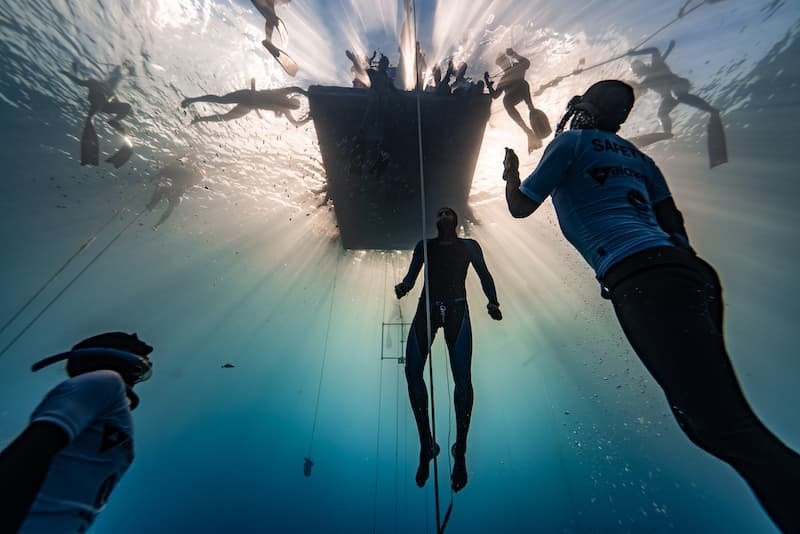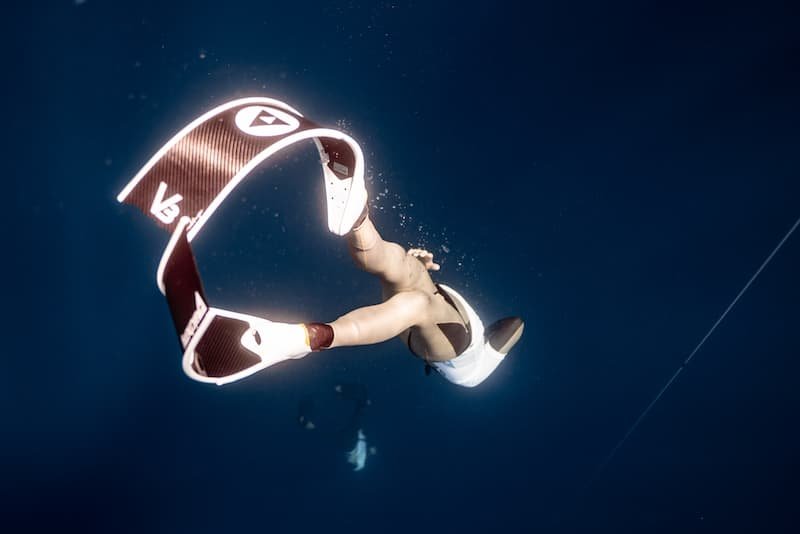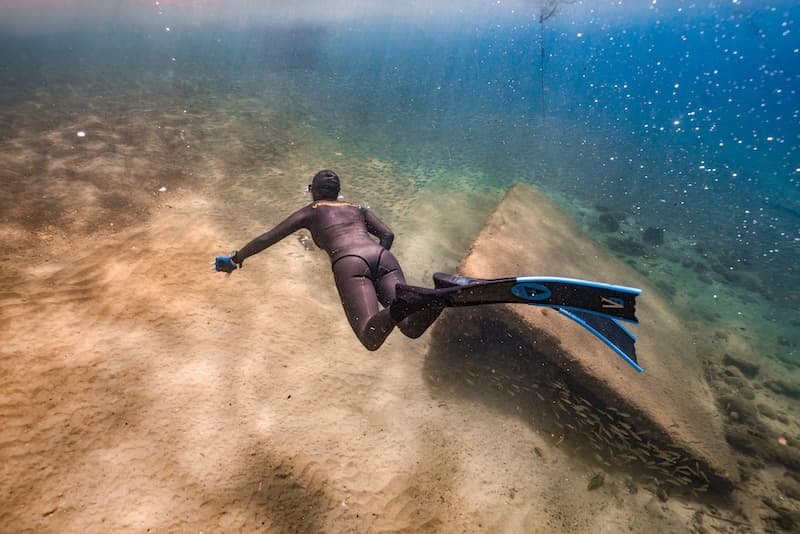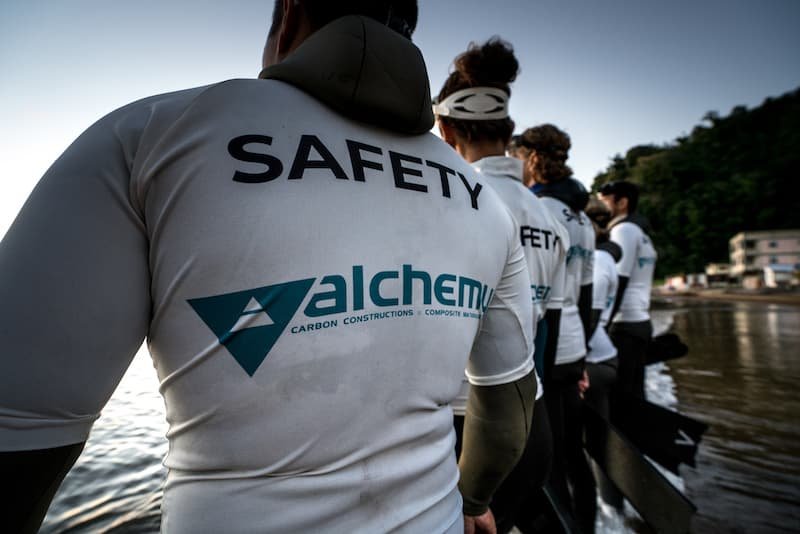
 Olivia Møller
Freediver - Activist - Explorer
Olivia Møller
Freediver - Activist - Explorer

 Olivia Møller
Freediver - Activist - Explorer
Olivia Møller
Freediver - Activist - Explorer
In the realm of sports like football or mixed martial arts, where physical prowess often defines success and athletes are deemed to have a limited "expiration date," the notion of age as a barrier to achievement looms large. However, freediving stands apart as a sport where chronological age holds little sway over one's potential for success. Unlike sports reliant on youthful vigor, freediving prizes experience, mental fortitude, and adaptability—qualities that often improve with age. In this blog post, we delve into why freediving transcends the conventional constraints of age, exploring the myriad ways in which maturity enhances proficiency beneath the waves.
Experience is often touted as one of the most significant factors contributing to freediving proficiency, and research supports this assertion. Studies have shown that experienced freedivers demonstrate superior performance and safety outcomes compared to their less-experienced counterparts.
A study published in the Journal of Applied Physiology examined the effects of experience on breath-holding abilities and physiological responses during freediving. The researchers found that experienced freedivers were able to achieve longer breath-holding durations and exhibited more efficient oxygen utilization compared to novice divers. This suggests that years of practice and exposure to the sport can lead to physiological adaptations that enhance freediving performance.
Furthermore, experienced freedivers possess a depth of knowledge accumulated through years of immersion in the sport. They have encountered a wide range of diving conditions, and this exposure has enabled them to develop strategies for adapting to different environments and navigating challenges effectively.
In addition to practical skills, experienced freedivers also benefit from a deeper understanding of safety practices and risk management. A survey conducted by the Divers Alert Network (DAN) revealed that experienced divers are more likely to adhere to safety protocols, such as buddy diving, proper equipment usage, and pre-dive checks. This heightened awareness of safety precautions reduces the likelihood of accidents and enhances overall diving safety.
Moreover, experienced freedivers often serve as mentors within the diving community, sharing their knowledge and expertise with novice divers. This mentorship fosters a culture of learning and continuous improvement, ensuring that the wisdom gained from years of experience is passed down to future generations of divers.
It's important to note that while experience plays a crucial role in freediving proficiency, it is not the sole determinant of success. Factors such as physical fitness, mental discipline, and environmental conditions also influence performance in the water. However, research consistently highlights the benefits of experience in enhancing safety, performance, and overall enjoyment of the sport.

Mental discipline and focus are essential components of freediving proficiency, enabling divers to maintain calm, control, and concentration underwater. Research in sports psychology and performance science sheds light on the cognitive processes underlying these mental attributes in freedivers.
A study published in the Journal of Sports Sciences investigated the relationship between mental skills and performance in elite freedivers. The researchers found that top-performing divers exhibited higher levels of mental discipline, including goal-setting, self-regulation, and focus enhancement techniques. These mental skills were identified as key factors contributing to their success in breath-holding and depth-diving disciplines.
Furthermore, neuroimaging studies have provided insights into the neural mechanisms underlying focused attention and concentration in experienced freedivers. Functional magnetic resonance imaging (fMRI) scans have revealed increased activation in brain regions associated with attentional control and executive function during breath-holding tasks. This suggests that experienced divers can regulate their attention more effectively, maintaining focus on the task at hand despite the physiological challenges of breath-holding.
Additionally, mindfulness-based practices have been shown to enhance mental discipline and focus in divers. A randomized controlled trial conducted by researchers at the University of Miami investigated the effects of mindfulness training on performance and psychological well-being in recreational divers. The study found that participants who underwent a mindfulness intervention demonstrated improvements in attentional control, stress reduction, and dive performance compared to those in the control group. These findings highlight the potential benefits of incorporating mindfulness techniques into freediving training programs to enhance mental discipline and focus.
In the context of competitive freediving, mental discipline and focus are crucial for achieving optimal performance while mitigating the risks associated with deep dives. Experienced divers employ various mental strategies, such as visualization, relaxation techniques, and attentional cues, to optimize their performance and manage stress underwater.

Physical conditioning plays a crucial role in freediving, as it directly impacts a diver's ability to endure the physiological demands of breath-holding and underwater exploration. Research in exercise physiology and sports science provides insights into the physiological adaptations that occur in response to freediving training and their implications for performance.
A study published in the European Journal of Applied Physiology examined the effects of long-term freediving training on cardiovascular and respiratory function. The researchers found that experienced freedivers exhibited enhanced cardiovascular fitness, including lower resting heart rates, increased stroke volume, and improved blood oxygenation capacity. These cardiovascular adaptations enable divers to sustain prolonged breath-holds and tolerate the physiological stress of deep dives more effectively.
Moreover, research has highlighted the importance of muscular strength and endurance in freediving performance. A study conducted by researchers at the University of Queensland investigated the muscle activation patterns during breath-holding tasks in experienced freedivers. The findings revealed increased activation of respiratory and postural muscles, indicating the importance of muscular endurance and control in maintaining buoyancy and stability underwater.
In addition to physiological adaptations, experienced freedivers demonstrate remarkable adaptability to the underwater environment. Studies have shown that divers can acclimatize to variations in water temperature, pressure, and visibility through repeated exposure and training. This adaptability allows divers to optimize their performance in diverse diving conditions and explore a wide range of underwater habitats with confidence.
Furthermore, research has examined the effects of specific training modalities, such as yoga and stretching exercises, on freediving performance and flexibility. A systematic review published in the Journal of Sports Sciences analyzed the evidence supporting the efficacy of yoga-based interventions in improving breath-holding capacity, lung function, and flexibility in divers. The review concluded that yoga practices, including pranayama (breathing techniques) and asanas (physical postures), can enhance physical conditioning and adaptability, thereby optimizing freediving performance.

Freediving carries inherent risks that must be carefully managed to ensure the safety of participants. Research in sports safety and risk management sheds light on the cognitive processes involved in assessing and mitigating risks in the context of freediving.
A study published in the International Journal of Aquatic Research and Education examined the factors influencing risk perception and decision-making in recreational divers. The researchers found that experienced divers demonstrated higher levels of risk awareness and were more likely to accurately assess environmental hazards, such as strong currents, changing visibility, and marine life encounters. These findings suggest that years of experience in the sport contribute to the development of perceptual skills and situational awareness that enhance divers' ability to anticipate and respond to potential risks.
Moreover, research has identified specific risk factors associated with freediving accidents and incidents. A retrospective analysis of diving fatalities conducted by the Divers Alert Network (DAN) identified breath-hold duration, depth, and blackout incidents as primary contributors to underwater accidents. Experienced divers are better equipped to recognize the warning signs of hypoxia (oxygen deprivation) and hyperventilation (excessive breathing), enabling them to intervene and prevent catastrophic outcomes.
In addition to individual risk perception, safety awareness encompasses adherence to established diving protocols and guidelines. A survey conducted by DAN among recreational divers revealed that experienced divers were more likely to engage in pre-dive safety checks, buddy diving, and emergency response training compared to novice divers. These safety practices are instrumental in minimizing the likelihood of accidents and facilitating timely intervention in the event of an emergency.

In the world of freediving, age is far more than just a number—it's a testament to the depth of experience, wisdom, and resilience that divers accumulate over time. As we've explored in this blog post, age enhances freediving proficiency in multifaceted ways, from the depth of knowledge and mental discipline to physical conditioning and safety awareness. Rather than viewing age as a limitation, let us embrace it as an asset—a catalyst for unlocking the depths of human potential beneath the waves.
So, the next time you witness a seasoned freediver gracefully gliding through the ocean depths, remember that their age is not a hindrance but a badge of honor—a symbol of the mastery that comes with time, dedication, and unwavering passion for the sea.